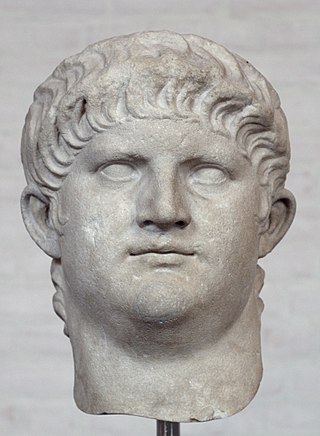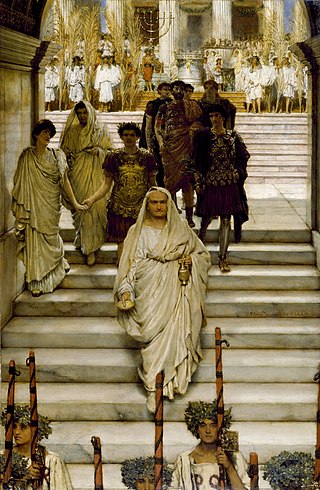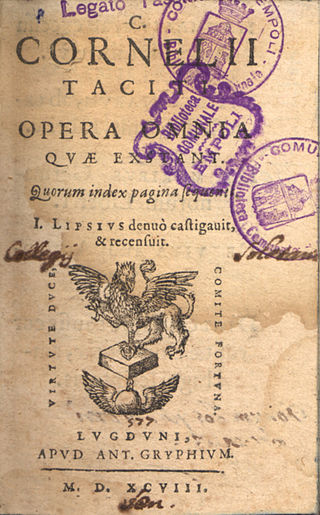Sources
- Tacitus, Annals xv. 49, 54, 55, 70
Flavius Scaevinus, a praetorian tribune and quaestor , was a member of the Pisonian conspiracy against Nero. It was through his freedman Milichus that Nero discovered the conspiracy. Afterwards, history is silent on the fate of Flavius, with some sources saying he was a consul under Otho, then exiled by Vitellius. Tacitus merely states that he "perished" after the conspiracy was exposed. [1] This has been taken to mean he was executed.

Nero Claudius Caesar Augustus Germanicus, was the fifth Roman emperor and final emperor of the Julio-Claudian dynasty, reigning from AD 54 until his death in AD 68. He was adopted by the Roman emperor Claudius at the age of 13 and succeeded him on the throne. Nero was popular with the members of his Praetorian Guard and lower-class commoners in Rome and its provinces, but he was deeply resented by the Roman aristocracy. Most contemporary sources describe him as tyrannical, self-indulgent, and debauched. After being declared a public enemy by the Roman Senate, he committed suicide at age 30.

The Roman historian and senator Tacitus referred to Jesus, his execution by Pontius Pilate, and the existence of early Christians in Rome in his final work, Annals, book 15, chapter 44.

Vespasian was a Roman emperor who reigned from AD 69 to 79. The fourth and last emperor who reigned in the Year of the Four Emperors, he founded the Flavian dynasty that ruled the Empire for 27 years. His fiscal reforms and consolidation of the empire generated political stability and a vast Roman building program.

Marcus Annaeus Lucanus, better known in English as Lucan, was a Roman poet, born in Corduba, in Hispania Baetica. He is regarded as one of the outstanding figures of the Imperial Latin period, known in particular for his epic Pharsalia. His youth and speed of composition set him apart from other poets.

Titus Caesar Vespasianus was Roman emperor from 79 to 81. A member of the Flavian dynasty, Titus succeeded his father Vespasian upon his death.
Ofonius Tigellinus (c. 10 – 69) was a prefect of the Roman imperial bodyguard, known as the Praetorian Guard, from 62 until 68, during the reign of emperor Nero. Tigellinus gained imperial favour through his acquaintance with Nero's mother Agrippina the Younger, and was appointed prefect upon the death of his predecessor Sextus Afranius Burrus, a position Tigellinus held first with Faenius Rufus and then Nymphidius Sabinus.
Quintus Marcius Barea Soranus was a Roman senator who lived in the reign of Nero. He was suffect consul in 52, but later attracted the hatred of Nero, and upon being condemned to death committed suicide. He was associated with a group of Stoics opposed to the perceived tyranny and autocratic tendencies of certain emperors, known today as the Stoic Opposition.

The Great Fire of Rome occurred in July AD 64. The fire began in the merchant shops around Rome's chariot stadium, Circus Maximus, on the night of 19 July. After six days, the fire was brought under control, but before the damage could be assessed, the fire reignited and burned for another three days. In the aftermath of the fire, two thirds of Rome had been destroyed.

The Flavian dynasty ruled the Roman Empire between AD 69 and 96, encompassing the reigns of Vespasian (69–79), and his two sons Titus (79–81) and Domitian (81–96). The Flavians rose to power during the civil war of 69, known as the Year of the Four Emperors. After Galba and Otho died in quick succession, Vitellius became emperor in mid 69. His claim to the throne was quickly challenged by legions stationed in the Eastern provinces, who declared their commander Vespasian emperor in his place. The Second Battle of Bedriacum tilted the balance decisively in favour of the Flavian forces, who entered Rome on 20 December. The following day, the Roman Senate officially declared Vespasian emperor of the Roman Empire, thus commencing the Flavian dynasty. Although the dynasty proved to be short-lived, several significant historic, economic and military events took place during their reign.

The conspiracy of Gaius Calpurnius Piso in AD 65 was a major turning point in the reign of the Roman emperor Nero. The plot reflected the growing discontent among the ruling class of the Roman state with Nero's increasingly despotic leadership, and as a result is a significant event on the road toward his eventual suicide and the chaos of the Year of the Four Emperors which followed.

The Annals by Roman historian and senator Tacitus is a history of the Roman Empire from the reign of Tiberius to that of Nero, the years AD 14–68. The Annals are an important source for modern understanding of the history of the Roman Empire during the 1st century AD; it is Tacitus' final work, and modern historians generally consider it his greatest writing. Historian Ronald Mellor calls it "Tacitus's crowning achievement", which represents the "pinnacle of Roman historical writing".

Histories is a Roman historical chronicle by Tacitus. Written c. 100–110, its complete form covered c. 69–96, a period which includes the Year of Four Emperors following the downfall of Nero, as well as the period between the rise of the Flavian dynasty under Vespasian and the death of Domitian. However, the surviving portion of the work only reaches the year 70 and the very beginning of the reign of Vespasian.
Antonius Natalis was an ancient Roman of the equestrian order who took part in the Pisonian conspiracy against Nero. As a conspirator, he provided Gaius Calpurnius Piso with secretive information regarding the emperor. After Flavius Scaevinus's freedman, Milichus, alerted Nero of Piso's conspiracy, Natalis, having met with Scaevinus that day, was suspected of being a part of the conspiracy. When he was questioned, Natalis disclosed information vital to the conspiracy, thereby avoiding punishment.
Titus Flavius T. f. T. n. Sabinus was a Roman politician and soldier. A native of Reate, he was the elder son of Titus Flavius Sabinus and Vespasia Polla, and brother of the Emperor Vespasian.
Titus Flavius Sabinus was a Roman senator who was active in the first century AD. He was twice consul suffectus, first in the nundinium of April through June of 69 with his brother Gnaeus Arulenus Caelius Sabinus, and again in May and June of 72 as the colleague of Gaius Licinius Mucianus.
Lucius Lusius Geta was a Roman politician in the 1st century AD.
Subrius Flavus was a tribune of the Praetorian Guard who was heavily implicated in the Pisonian conspiracy against the Emperor Nero and was executed in 65 CE for his involvement.
Lucius Annius Vinicianus was a Roman senator during the Principate. He is best known for his involvement in the assassination of Caligula and a rebellion against Claudius.
Annius Vinicianus was a Roman senator during the later part of the first century. He is best known from a failed plot to overthrow Nero in 66.